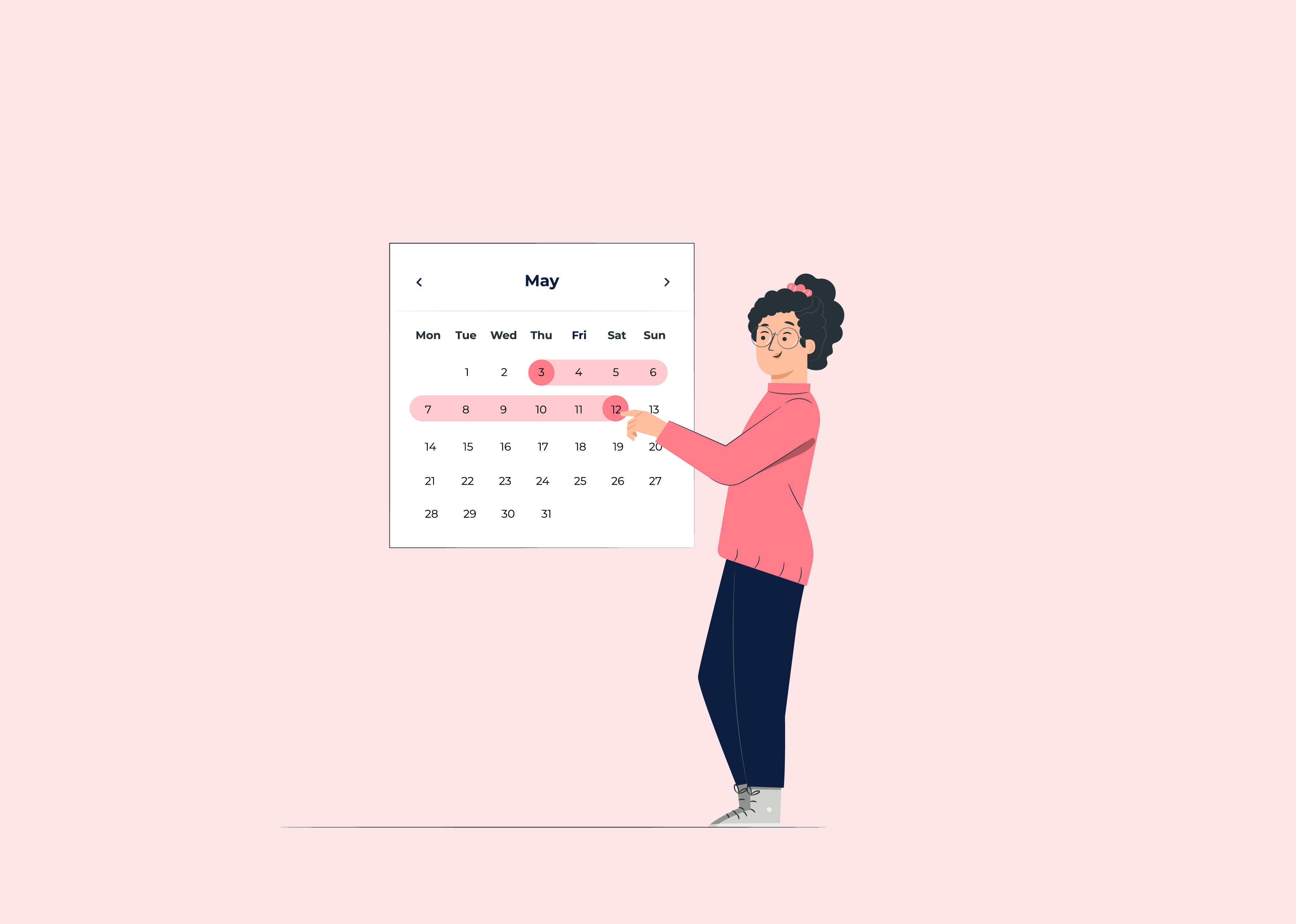
In the Netherlands, we have some of the best procedures that help us maintain a strong work/life balance. So how do we achieve this? We’ve considered all of the reasons an employee may need to take leave from work and come up with criteria for employees to take this leave as part of their paid time off (PTO).
As an employer in the Netherlands, you should have your finger on the pulse and give your employees guidance with respect to their rights on leave of absence.
Read on to learn more about the statutory provisions for different types of leave in which an employee is entitled.
Holiday leave entitlement
In the Netherlands, the employees receive the legal minimum of vacation days, which accounts for 4 times their ordinary hours of work per week. For part-time employees, the number of leave hours is calculated correspondingly. Full-time employees are entitled to at least 4 weeks of paid annual holidays, which is equivalent to 20 vacation days. However, it is common for employers to offer up to 25 holidays per year, apart from 10 Dutch public holidays.
The official public holidays in the Netherlands are:
- New Year’s Day
- Good Friday (depending on Collective Labour Agreement)
- Easter Sunday
- Easter Monday
- Ascension Day
- Whit Monday
- King’s Day
- Liberation Day (every 5 years)
- Christmas Day
- Boxing Day
Employees can start accruing leave from their first day of work. Holidays should be taken as much as possible in the year in which the entitlement to these holidays is acquired. Unused holiday days are paid in accordance with the Dutch Civil Code at the end of employment. An excess of holiday days taken shall be deducted from the salary or final settlement at the termination of employment.
During the holidays, the employer is obliged to pay the employee’s salary as usual. Aside from that, the employee is also entitled to a holiday allowance, which is a minimum of 8% addition to the annual salary. The holiday allowance is granted to the employee in May or June.
Sick leave entitlement
The basic sick leave entitlements of all employees are covered in the legislation. The scheme allows the employee to take leave in case of personal illness and receive sick pay. The obligation of the employer is to pay at least 70% of the employee’s most recent earned wage. Some employers even offer to pay 100% of the wages.
In the event of a disabled employee becoming ill, the employer can apply for wage compensation benefits at the Employee Insurance Agency (UWV). This is called ‘no-risk policy’, in which the employer continues to pay employee’s wage and redeem the benefits against this.
Care leave entitlement
Employees in the Netherlands can make use of care leave to provide care and support for an immediate family member or household member who is suffering from an illness. This leave takes effect on the condition that the sick person requires care and the employee is the ONLY person who can provide it. If the sick person is in the hospital, care leave is not applicable because the hospital provides the care. A confirmation from a qualified health practitioner must be provided if the employee wishes to take out this leave.
- Within a 12-month period, employees are entitled to take short-term care leave equal to twice their working hours. During this time, the employer must pay at least 70% of their salary.
- For life-threatening illness, long-term care leave is also possible, up to six times one’s weekly working hours. However, the employer is not obliged to pay any salary during this period.
Maternity and Parental leave entitlement
- Maternity leave
The Dutch government required pregnant employees to take time off a minimum of 4 weeks before the due date. In fact, pregnant employees are entitled to 4–6 weeks of pregnancy leave (before the due date) and at least 10 weeks of maternity leave (post-childbirth).
- If the baby is born later than the due date, the employee’s maternity leave begins after the actual birth and the total may, therefore, be longer than 16 weeks.
- If the mother dies in childbirth, her partner can access maternity leave.
- If the employee is expecting multiple births, she is entitled to at least 20 weeks of pregnancy leave. She is also entitled to maternity pay. For an employer, you can apply for maternity and pregnancy benefit from the Employee Insurance Agency (UWV).
- Partner/paternity leave
The paternity leave entitlement kicks in when the partner of the employee gives birth. The employee can request 1 week of paid leave following the birth and any time in the first 4 weeks after the birth of the child. The employer is required to pay 100% of the employee’s salary when they take out this leave.
From 1st July 2020, employees have the right to take 5 weeks of unpaid leave in the first 6 months after birth. In this event, the partner leave benefits are administered by the Employee Insurance Agency (UWV), which constitutes 70% of employee salary. To be eligible for the benefits, the employee has to apply for the leave themselves.
- Parental leave
Employees are entitled to 26 weeks of parental leave if they are the legal parent or caretaker of a child, during the first 8 years of the child’s life. It is a requirement that the employer grants this leave to the employee. In general, parental leave is unpaid, but the employer can partially cover the cost.
Adoption leave
Employers must provide employees with 6 weeks of time off if the employee adopts a child or takes in a foster child. This type of leave is available for both parents. During the leave, the employee can make use of an adoption/foster care allowance that matches their salary from the Employee Insurance Agency (UWV).
Only for potent business reasons can the employer reject this leave.
Personal emergency leave
In the Netherlands, employers must grant permission for personal emergency leave and continue paying employees’ salaries. Short-term leave is also available in reasonable situations. This leave of absence may be taken in case of unforeseen personal circumstances such as injury, illness, family member’s death, et cetera.
Special or extraordinary leave
While not required by law, the employer should include this leave entitlement in the individual agreements or employment contract between them and the employee. Insofar as the absence is necessary during the working hours, it is important that the employer understands this entitlement and allows the employees to access leave should they need to deal with such situations.
Examples of this leave are:
- Marriage, marriage anniversary
- Doctor appointment
- Funeral
- Moving house
- Study and exam purposes
Wrapping it up
There are many reasons why an employee may need to take time off work. It is crucial that the employer ensures compliance with changing laws and informs employees of their rights.
In addition, the Netherlands is ranked as the best for work-life balance according to OECD in part due to these leave entitlements. Adequate breaks from work are essential for an employee’s mental health. From a business point of view, being caring and offering support when an employee is in need also serves as a good retention strategy.
Octagon Professionals are experts in employment law in the Netherlands with 30 years of experience. If you are new to employing in the Netherlands, our experts can help you understand more about immigration, tax and statutory entitlements. Get in touch with us for advice!
more news

Five Key Elements Recruiters Seek When Reviewing a Resume
26-07-24
Crafting a standout resume/CV that captures a recruiter’s attention in the Netherlands can be a unique challenge. If you’re aiming to make a memorable impression, this guide is here to help. Whether you’re a seasoned professional or a newcomer to ...

Navigating Holiday Allowance and Time-Off Policies in the Netherlands
18-07-24
Summer is here in the Netherlands, which means everybody is preparing their out-of-office messages for their holidays! It is also the time of year businesses really review their time-off policies in the Netherlands. Although employers in the Netherlands are required ...